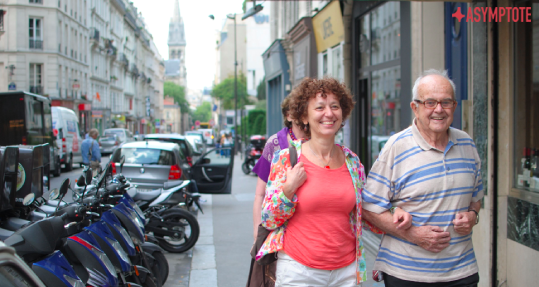This Translation Tuesday, we feature an excerpt from Simona Bohatá’s novel that offers the reader a kaleidoscopic perspective on a slice of the working class in 1980s Czechoslovakia. With prose reminiscent of Bohumil Hrabal, the novel was nominated for the Magnesia Litera Prize in the Czech Republic where the jury praised Bohatá’s characters as “so full-blooded that we can almost feel their pulse.” As you glimpse into this fascinating novel of the everyday, hear from translator Alžběta Belánová on the intricacies of representing the Prague slang.
“The novel offers an up-close-and-personal look at the grimy, crumbling world of workers’ settlements, pubs and salvage yards in 1980s Czechoslovakia, and the lively assortment of bizarre characters who inhabit it. Young Beny leaves home to escape a violent and abusive father to find refuge at a scrapyard run by someone they call the Fabrikant. Together with Hany who is handicapped, a drifter called Julča and Beny’s brother Vítek, they form a quirky new family. While the author certainly shows the dark and disturbing reality of this era—Beny and the others were certainly dealt a hard hand in life—the book doesn’t just serve up misery as the real time storyline moves in an almost optimistic direction. Beny is truly lucky, as he manages to find a better job and ends up having more time for his one passion, which is photography. As with other Simona Bohatá’s works, the biggest challenge for the translator is capturing the atmosphere of the novel, which the author achieves through the use of heavy working-class Prague slang, what is more, spoken by teenagers. Linguistically, I found a parallel with The Basketball Diaries memoir (and similar such works), which achieves the same effect through the use of heavy New York slang and a disarmingly familial tone of the various journal entries. I found this quite inspiring for my translation and was able to draw on that to find the right voice for Beny and the others.”
—Alžběta Belánová
Beny
He was mad as hell as he walked up the street, angry with himself for letting it get to him even after all these years. He ran into them stupidly on the corner right by the ice cream parlour. They were laughing but stopped when they caught sight of him. Two, maybe three of them said “hey,” while the others bent their heads down in embarrassment. Beny was ten times more embarrassed though because they split the embarrassment up among themselves but he had to go at it alone.
Classmates, he thought and smirked to himself. They were thick as thieves all of year eight including Jana and Bingo whose grades were just as shitty as Beny’s. But Bingo’s mom came down hard on him, forced him to start cramming and managed to get him through to ninth grade. No one came down hard on Beny though, so he had to go off to trade school right out of eighth grade while Bingo went on to ninth grade with all the others and then on to grammar school.
He was a leper to them ever since. It only took one time when he met up with them after summer vacation to figure that out. He was sitting with them outside the Bookworm restaurant and it was as though he was invisible to them. They wouldn’t look him in the eye. Jana was latched on to Bingo who was telling idiotic stories. The very same Jana who was telling him how much she loved him only half a year ago. They didn’t even notice when he left. He didn’t see them for more than four years after that and now he had to go and run into them all together like that.
He wanted to go home but felt all out of sorts so he headed to the scrapyard.
“Fuck them, dude . . . they’re just spoiled brats.” Fabri handed him an opened bottle and Beny took a big gulp to wash the anger down. Fabri went on with his philosophizing.
“Where the hell would they be without their filthy rich fathers? Bullshit, rich brats . . . with parents in high places . . .” He shot a side glance at Beny and was glad to see him smile. READ MORE…


